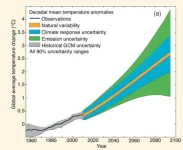You saying something does not make it true!
You asked me if I was aware of any issue in changing resolutions. I gave you an answer.
And yes, it's true. The different data sets are clearly identified, along with uncertainty levels for the older data, and that is more than sufficient to show that massive spikes are not part of normal variation.
Let's get back to the facts
The facts are that human activity has caused almost all of the warming we've observed in the past ~150 years.
No amount of equivocation on your part changes that.
The climate's response to humans emitting massive amounts of greenhouse gases is higher temperatures. That's not "subjective." Uncertainties about climate response also are not "subjective." I can only conclude that you have no idea what "subjective" means.
We are asked to believe these feedbacks exists at the higher levels, not based on the empirical evidence, but
on wishful thinking.
No, it's based on empirical observations. We determine how much CO2 is in the atmosphere with actual measurements. We know how much CO2 was in the atmosphere previously, and how much the amounts changed, based on actual measurements. We know about permafrost melting at faster rates because of actual research in the field. We know about the presence of soot impacting ice mass losses based on research. We don't know if the Larsen C ice shelf will break up entirely (hence some uncertainty), but we do know based on empirical observations that it can happen, and we can reasonably estimate the effects of such a collapse.
We don't know everything, but what we do know is based on observations and research; and we
are increasing our knowledge, and developing better estimates of effects and feedbacks.
The IPCC itself knows better that to drive a stake in the ground that can be shown to be in error,
and so wisely defines a broad range, with the low end close to the CO2 forcing range.
:roll:
The IPCC is very clear on its position. At least half of the uncertainty is because we aren't sure of climate response. However, at least half (if not more) of the uncertainty is because we don't know what human beings will do. I.e. much of that "broad range" is because humans are unpredictable.
What you seem to somehow ignore is that
even if the effects of climate variability are low, there will STILL be devastating impacts on the environment and organisms, including humans. Even if some of the worst case scenarios don't happen until 2025 or 2030, it's coming, and we are already seeing some of the damage: More intense storms, more droughts, more floods, more heat waves, higher sea levels, dangerous cold snaps, and more. Again, the nonsense you spin does not change that fundamental fact.


